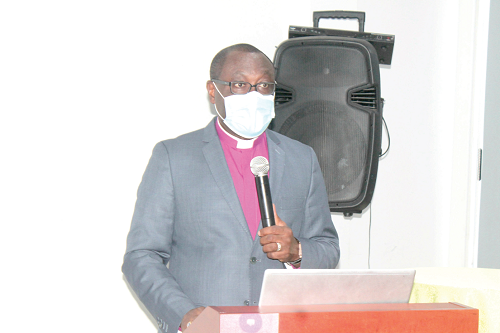The National Peace Council has charged its national and regional representatives to prepare themselves to play a part in dealing with threats of terrorists and violent extremist attacks.
The Chairperson of the Governing Board of the NPC, Rev. Dr Ernest Adu-Gyamfi, who gave the charge, said given the porous borders across the sub-region, there were growing fears of the spread of extremist groups across West Africa, including Ghana.
He, therefore, underscored the need for the council to first play a part in dealing with the domestic threats of chieftaincy and ethnic clashes, farmer-herder conflicts, violent demonstrations, armed robberies, among others, which provided fertile ground for violent extremist actions.
Dr Adu-Gyamfi was speaking at the opening of a two-day workshop yesterday on preventing and countering violent extremism in the country.
The workshop was organised with support from the Commonwealth Secretariat.
Workshop
The workshop, which brought together board members and chairpersons of the regional council, is expected to help the NPC to facilitate and continue its work within communities to promote peace-building, facilitate social cohesion, deepen inter-faith harmony by way of preventing and countering violent extremism in the country.
The participants were taken through the basic measures of preventing and countering violent extremist approaches, increasing mediation and stakeholder management skills, as well as understanding violent extremism in the Ghanaian context.
The workshop, Rev. Dr Adu-Gyamfi said, would help to close the gaps that existed between the Governing Board and the Regional Councils as it was the first time a governing board of the NPC was meeting all the regional chairmen of the Peace Council.
That, he said, would allow the members on both sides to fraternise, create new bonds and strengthen existing ones.
“It is my expectation that by the close of the two days’ training session, relations between the Governing Board and the Regional Councils would have been better harmonised and synergised for greater efficiency in discharging our collective mandate,” he said.
Support
Rev. Dr Adu-Gyamfi commended the Commonwealth Secretariat for supporting the NPC in organising the capacity-building workshop as it came at the right time, considering the threat posed by terrorism and violent extremism activities in the Sahel and other neighbouring countries even though the country had consistently been celebrated as a stable democracy.
He further urged participants to take advantage of the training session in order to add value to themselves and position the council to deliver on its mandate effectively.
Presentation
For her part, the Programmes Officer at the Countering Violent Extremism Unit at the Commonwealth Secretariat, Ms Amy Longland, who joined the workshop via zoom, in her presentation defined extremism as the use of violence and support for violence in pursuit of ideological, religious or political goals.
She said although freedom of expression was protected under International Law, there were certain limitations which included speeches that incited violence.
She further advocated the need to uphold human dignity and protect marginalised groups in the country.
Ms Longland identified the use of non-coercive means to dissuade individuals and groups from mobilising towards violence and to mitigate recruitment, support and engagement in ideologically motivated terrorism by non-state actors in furtherance of political objectives as some of the key elements of countering violent extremism.

